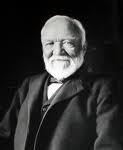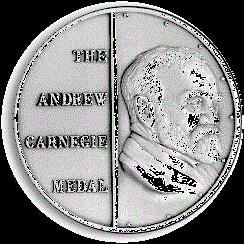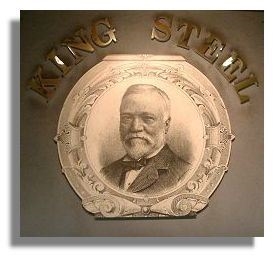 |
| Andrew Carnegie (Google Images, barbellsandbacon.com) |
Aristophanes once said, “Let each man exercise the art he knows.” These words may not have inspired Andrew Carnegie but he followed them devoutly. The king of the steel industry should not be remembered just as that, for he was so much more. He was a man of much more depth and virtue. Born in Scotland and forced to move to America, Carnegie started life out as a penniless immigrant. He eventually got a job at the Pennsylvania railroad which revealed to him the possibilities of interest in steel. But as steel was slow and difficult to produce, he went to England to bring back a design for a new steel refiner which could produce more steel, faster. This kick-started the Carnegie Steel Company in the mid 1870’s. Carnegie was a brave soul for taking risks even in the face of catastrophic failure. His unwavering determination drove him forward through many trails and business venture without hesitation, which allowed him to focus on his true interest, the bettering of society through the effective use of money. Donating and giving grants to many people and groups, his name is now currently on many buildings and a foundation. Despite the world’s view of wealth which would corrupt those who had money, Carnegie stood tall and overcame all his obstacles in order to achieve his dream and help those suffering around him. Andrew Carnegie was known for his bravery and willingness to take risks in dangerous situations in order to achieve his ambitions.
 |
| The Carnegie Medal (http://www.ala.org/ala/mgrps/divs/alsc/awardsgrants/bookmedia/carnegiemedal/carnegieabout/index.cfm) |
At the beginning of his business career, Carnegie decided to take a risk: “He divested himself from all his businesses and used his money to start a company in 1870 that would produce iron and steel.” (Andrew Carnegie). By taking out all of his money from his businesses he created an all-or-nothing gamble. Barely managing to start his steel company, Carnegie’s company, like all others, made steel at a very slow rate. But spending his remaining money, Carnegie went to England to buy a new type of steel refiner which increased the production rate of steel. He again shows his fearlessness when: “He broke an attempt to unionize at his Homestead mill in 1892 with a lockout and a protracted, violent strike.” (Andrew Carnegie). Breaking the Homestead mill union was one of the toughest challenges Carnegie had, and yet he faced it with undeterred courage despite the potential for failure. Also by breaking the union he proved that nothing could stop his ambition of creating a leading steel company with steel prices that are cheap enough for others to buy, not raised by increased need for profit. Despite ruthlessly pursuing his ambition, Carnegie showed his true virtues in his selfless and generous personality.
 |
| Andrew Carnegie declared King of Steel (http://www.rampantscotland.com/visit/bldev_visit_pittsburgh.htm) |
Even with all of his success, Carnegie was selfless believing that wealth was something that only the corrupt hope to acquire and essentially worship. His values about philanthropy are revealed when he declares a “’man of wealth,” must act as: “…trustee and agent for his poorer brethren, bringing to their service his superior wisdom, experience, and ability to administer, doing for them better than they would or could do for themselves.” (Andrew Carnegie). Carnegie strongly believes that the rich should spend their money on the betterment of society and encourages others to do the same. He fought relentlessly for the poor, challenging those of any wealth to donate to any who would spend the money effectively and not squander it. Money spent for the benefit of all was his main purpose as a philanthropic leader and to him: “’Nothing was worse,’ he wrote, than ‘the worship of money.’” (Andrew Carnegie). His efforts were focused away from the accumulation of wealth but instead its redistribution to society as a means of improvement. Refusing to let money rule him like it had ruled others shows that he preferred to let the wealth be a tool not a God. His selflessness was again demonstrated when he built many libraries and a foundation for the education of the impoverished with the hope that his dreams shall continue to be carried out.
Through his determination and bravery Carnegie was able to pull together his company and used the money from this in order to help the people around him in positive ways. Willing to risk everything, he saved his company and was able to achieve his dream as the top of the steel industry, revolutionizing American cities and making him the richest man in the world. Ignoring his wealth, he spent a majority of his life giving away his money to organizations and companies that he believed would help all of society. He is a man of great virtue believing that helping others and improving society as a whole was worth more than all the personal wealth he could ever acquire. It is not one’s thoughts, but words and actions that affect those around them. Carnegie is known for saying, “I believe the true road to pre-eminent success in any line is to make yourself master in that line….” He shows his belief in that statement through all the aspects of his life and the morals he held dear. Knowing well that those who hoarded their wealth would be corrupted, he rejected all of it and focused on the survival of his company and the effective redistribution of his money for the good of all.
"Andrew Carnegie 1835-1919." American Eras. Detroit: Gale, 1997. Gale Student Resources In Context. Web. 13 Dec. 2010.
"Andrew Carnegie." Encyclopedia of World Biography. 2nd ed. Vol. 3. Detroit: Gale, 2004. 309-312. Gale Virtual Reference Library. Web. 13 Dec. 2010.
Page created on 1/13/2011 12:00:00 AM
Last edited 1/13/2011 12:00:00 AM
